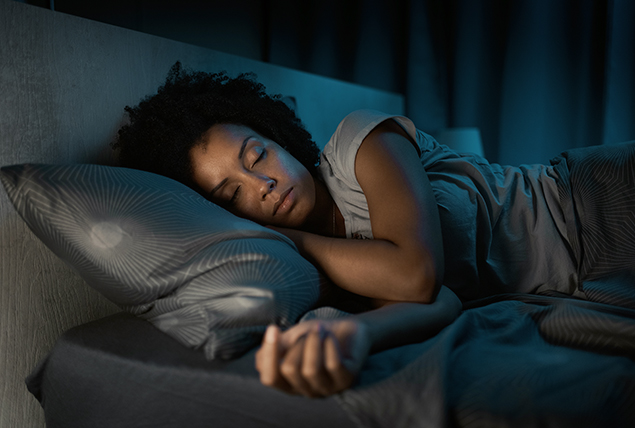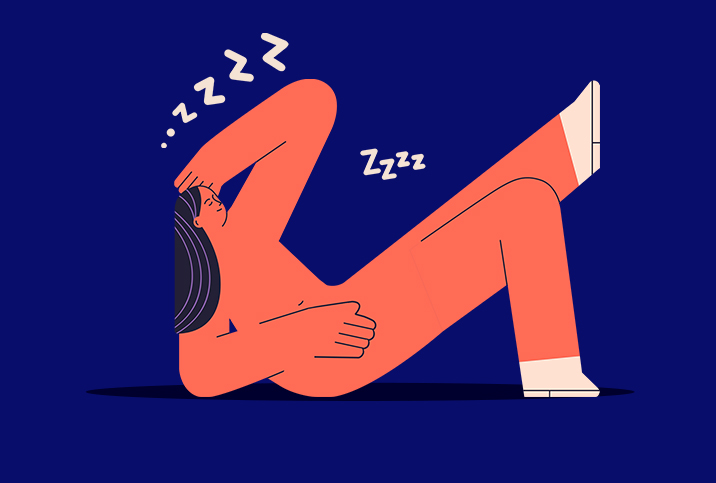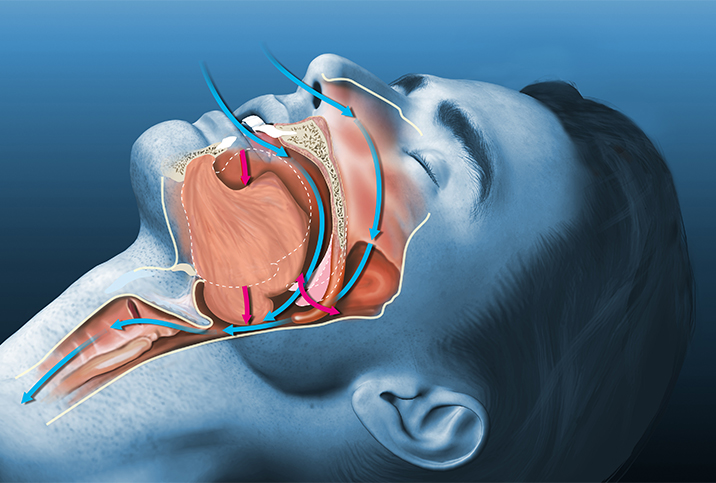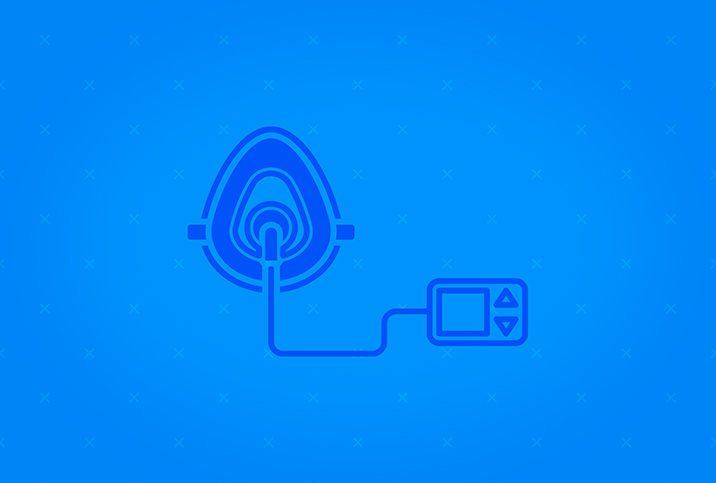What Happens When We Sleep and Why Is It so Important?

It's a process we engage in each and every night, yet its inner workings remain a mystery for many people. Sleep is a vital human function, and many people suffer chronically from getting too little of it or may struggle with various sleep disorders that make a good night's rest hard to come by.
Sleep can also affect sexual health. Research has shown that quality sleep can promote a better sex life, and a healthy sex life can facilitate improved sleep, according to the Sleep Foundation.
The first step to improving your sleep is to learn exactly how it works and why it's so important.
The stages of sleep
Thanks to the invention of the electroencephalogram (EEG)—which records the brain's spontaneous electrical activity—scientists now understand the many important processes that occur while we sleep. Experts have identified four main stages of the sleep cycle that coalesce to create a natural bodily phenomenon without which we wouldn't survive.
"When we sleep, our body's cells regenerate," said Michael Pelekanos, M.D., who serves as medical director of Valley Sleep Center in Chandler, Arizona. "It allows us to quiet our minds and create memories, and it allows our bodies to heal."
Here are the stages of our regular sleep function:
Presleep
Scientists have monitored changes in brain waves that occur as we begin to fall asleep, which may explain the surreal moments that happen only in the twilight stage between waking and sleeping life.
"As your body relaxes and you settle in to fall asleep, your brain activity displays a small, fast wave pattern called beta waves," Pelekanos explained. "After several minutes, you enter that twilight-type state of almost being asleep as your body continues to relax and your brain switches to alpha waves. During this time frame, you may experience hypnagogic hallucinations, like feeling as if you are falling or hearing someone call your name. Myoclonic jerks—the random, sudden and startled movements of a body part—also happen during this presleep stage."
Stage 1
The sleep cycle officially begins with stage 1, sometimes called light sleep. During this transition from wakefulness to sleep, EEGs record theta brain wave patterns, which last only about five to 10 minutes. Pelekanos said this stage of the sleep cycle is unique in comparison to the stages that follow.
"Stage 1 is only encountered at the beginning of the first sleep cycle when you fall asleep and, unlike other stages, it is not repeated over the course of the night," he said. "Someone awakened while in this light sleep stage may not even think they have slept."
Stage 2
The least physically active component of the sleep cycle, the second stage is often referred to as unconscious sleep and usually lasts about 20 minutes. During this time, we appear unconscious, though our brain waves become more rapid.
"During this stage, your body further relaxes and your body temperature decreases as your heart rate slows down," Pelekanos said. "This is the first stage where the brain and body begin to have a divergent experience, the brain becoming more active as the body becomes more passive."
Stage 3
The third stage of the sleep cycle occurs when we transition from light rest to the deepest sleep. Often called delta sleep because of the delta brain wave activity recorded on EEGs during this stage, this is the time when it's hardest to wake a sleeping person, as well as when disruptive sleep-related disorders known as parasomnias are most likely to occur.
"Parasomnias like bedwetting, night terrors and sleepwalking generally occur during this part of the sleep cycle," Pelekanos said.
Stage 4
The fourth stage of the sleep cycle—which occurs, along with the second and third stages, several times throughout the night—is known as REM sleep, named after the rapid eye movements that occur during this time. Our first REM stage of the night is usually very short, lasting only a few minutes, but as the night progresses, each REM stage lasts longer than its predecessor. By morning, you may undergo a REM stage lasting as long as an hour. Pelekanos said this stage is the most memorable, as it's when we dream.
"When you enter REM sleep, your respiration and brain activity increases," Pelekanos said. "Your brain wave patterns resemble those captured when you are awake. This is the stage when the majority of dreaming occurs. Also called paradoxical sleep, during this stage, your brain and body have paradoxical experiences. As your brain activity increases, your body relaxes and all voluntary muscles become paralyzed. Because REM sleep and wakefulness are so similar from the perspective of your brain, this paralysis, called atonia, is necessary to ensure your body does not act out what your brain is dreaming."
Why is sleep so important?
As Pelekanos simply put it, sleep is important because "sleep is life" itself.
"Sleep is the foundation for our physical, mental and emotional well-being," he added.
Chelsie Rohrscheib, Ph.D., is a sleep specialist at Wesper, a company based in New York City that produces wearable sleep diagnosis tools intended to help people improve their sleep. As a researcher in clinical sleep medicine and sleep science, she detailed a number of essential biological functions that occur only during sleep:
- Brain cell management, which includes strengthening or weakening the connections between neurons, making new connections or removing connections
- Clearing waste products from the brain
- Consolidating short-term memory into long-term memory
- Emotional processing
- Release of specific hormones
- Repairing our cells, tissues and organs
- Strengthening the immune system
"Each stage is essential, but stage 3 and stage 4 of the sleep cycle are particularly important for achieving these biological functions," Rohrscheib said. "Most of the body and brain maintenance and repair occurs during stage 3, while memory consolidation and emotional processing usually occur during REM."
How much sleep do we need?
You may have heard the exact requirement for a good night's rest is a full eight hours, but Rohrscheib said there's some flexibility in determining how much sleep each of us needs, depending on our genetics, lifestyle and health.
"Adults require seven to nine hours of sleep per night to accomplish all of the functions that occur during sleep," she noted. "But the exact sleep time you need is highly dictated by your genetic profile. It's important to learn how much sleep time your brain and body need to feel refreshed and allow yourself enough time in bed to achieve enough sleep every single night. Sticking to a strict sleep schedule will ensure that you consistently get enough sleep. Other factors, such as physical activity and certain health issues, may increase the amount of sleep you need."
Myths and misconceptions about sleep
Rohrscheib and Pelekanos tackled some common myths and misconceptions about sleep, offering expert insight into the reality of sleep health.
Myth: You can survive on less than seven hours of sleep per night
Reality: "A very small percentage of the population can survive on less than seven hours of sleep, but the large majority of people cannot," Rohrscheib clarified. "If you are not in the very small minority of people who are 'short sleepers,' the long-term effects of chronic sleep deprivation will lead to various health issues."
Myth: Everyone who snores has sleep apnea
Reality: "While it's true that snoring can be a sign of sleep apnea, this doesn't mean that everyone who snores has sleep apnea," Pelekanos said. "It also doesn't mean that you don't have sleep apnea if you don't snore. People with sleep apnea stop breathing while they are asleep, sometimes hundreds of times a night. This impacts their overall health by interrupting their sleep cycle and 'stealing their sleep' and can also cause immediate, life-threatening circumstances.
"If you snore and/or experience other sleep apnea symptoms like daytime sleepiness, you should speak to your doctor about doing a sleep study," he added. "Getting a diagnosis and treatment plan can help mitigate the negative effects of the condition."
Myth: 'Night owls' are unhealthy and abnormal
Reality: "The time you are asleep and awake is highly dictated by your genes," Rohrscheib said. "At least 20 percent of the population has genetic variants that make their 24-hour biological clock run on a much later schedule. This means they will naturally feel sleepy late at night and naturally wake up late in the morning. While it's true that society mostly revolves around typical 9-to-5 hours, which makes it difficult to function if you're a night owl, your sleep schedule is not actually considered unusual."
Sleep matters
For Pelekanos and his colleagues in sleep medicine, the bottom line is that sleep—particularly healthy, restful sleep—matters more than we may realize.
"The restorative benefits of quality sleep are well documented. Even in the restive state of sleep, the mind and body are busy with crucial processes elemental to good health," Pelekanos said. "These include regulating vital biological and mental functions such as metabolism, appetite control [and] cleansing the body of harmful toxins, as well as regulating emotions and processing experiences. If, for any reason, the natural sleep pattern gets disturbed or the quality of sleep gets diluted, it can trigger health complications and lead to sleep disorders."


















